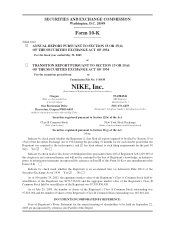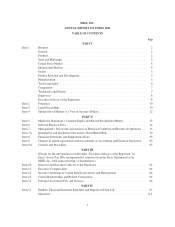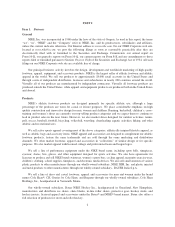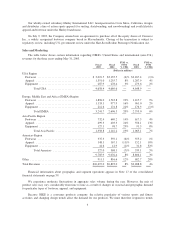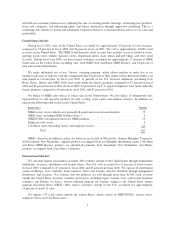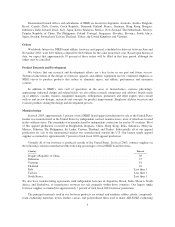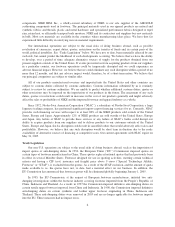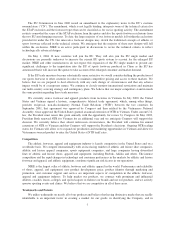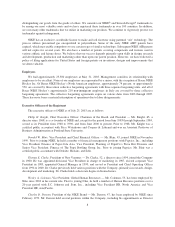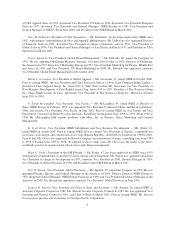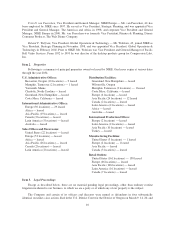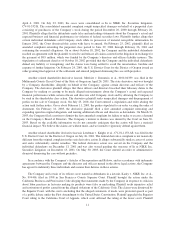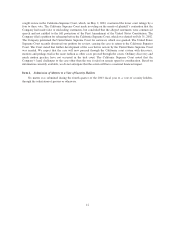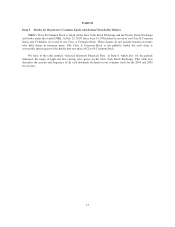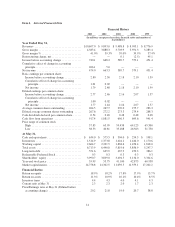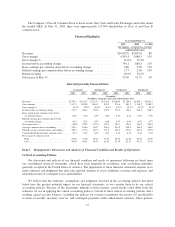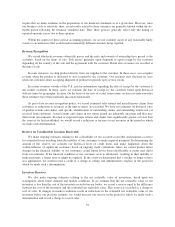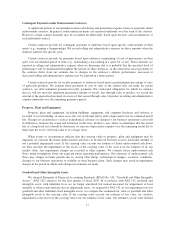Nike 2003 Annual Report Download - page 8
Download and view the complete annual report
Please find page 8 of the 2003 Nike annual report below. You can navigate through the pages in the report by either clicking on the pages listed below, or by using the keyword search tool below to find specific information within the annual report.The EU Commission in June 2000 issued an amendment to the explanatory notes to the EU’s customs
nomenclature (“CN”). The amendment, which is not legally binding, interprets some of the technical criteria for
the STAF exclusion and the footwear types that can be classified as for use in sporting activity. The amendment
restricts somewhat the scope of the STAF exclusion from the quotas and also the sports footwear exclusions from
the two EU anti-dumping measures. To date, the large majority of our footwear models fall within the exclusions
provided for under the CN. Our innovative footwear designs may stretch the traditional concepts of athletic or
sports footwear reflected in the technical criteria. We anticipate that the majority of these new designs will fall
within the exclusions. NIKE is an active participant in discussions to revise the technical criteria to reflect
technologically advanced designs.
On May 1, 2004 10 new countries will join the EU. They will also join the EU single market and
discussions are presently underway to increase the current EU quota system to account for the enlarged EU
market. NIKE and other manufacturers do not expect this expansion of the EU single market to present any
significant challenges to the importation into the EU of sports footwear produced in China as the EU has
announced that it will increase the quotas to take account of the enlarged consumer and market demand.
If the EU trade measures become substantially more restrictive we would consider shifting the production of
our sports footwear to other countries in order to maintain competitive pricing and access to these markets. We
believe that we are prepared to deal effectively with any such change of circumstances and that any adverse
impact would be of a temporary nature. We continue to closely monitor international restrictions and maintain
our multi-country sourcing strategy and contingency plans. We believe that our major competitors stand in much
the same position regarding these trade measures.
We currently source footwear and apparel products from factories in Vietnam. In July 2000, the United
States and Vietnam signed a historic, comprehensive bilateral trade agreement, which, among other things,
provides reciprocal, non-discriminatory Normal Trade Relations (“NTR”) between the two countries. In
September 2001, that agreement was approved by Congress and then ratified by the Vietnamese National
Assembly. Once approved, the United States granted an annual extension of NTR to Vietnam. Under current U.S.
law, the President must renew this grant annually with the opportunity for review by Congress. In May 2003,
President Bush renewed NTR for Vietnam for an additional year and we anticipate Congress will support this
decision. We currently believe that, absent unforeseen circumstances, the President will continue his annual
extensions of NTR to Vietnam and that Congress will support the President’s decisions. Ongoing NTR trading
status for Vietnam will allow us to expand our production and marketing opportunities in Vietnam and allow for
Vietnamese-sourced product to enter the United States at NTR tariff rates.
Competition
The athletic footwear, apparel and equipment industry is keenly competitive in the United States and on a
worldwide basis. We compete internationally with an increasing number of athletic and leisure shoe companies,
athletic and leisure apparel companies, sports equipment companies, and large companies having diversified
lines of athletic and leisure shoes, apparel and equipment, including Reebok, Adidas and others. The intense
competition and the rapid changes in technology and consumer preferences in the markets for athletic and leisure
footwear and apparel, and athletic equipment, constitute significant risk factors in our operations.
NIKE is the largest seller of athletic footwear and athletic apparel in the world. Performance and reliability
of shoes, apparel, and equipment, new product development, price, product identity through marketing and
promotion, and customer support and service are important aspects of competition in the athletic footwear,
apparel and equipment industry. To help market our products, we contract with prominent and influential
athletes, coaches, teams, colleges, and sports leagues to endorse our brands and use our products, and we actively
sponsor sporting events and clinics. We believe that we are competitive in all of these areas.
Trademarks and Patents
We utilize trademarks on nearly all of our products and believe that having distinctive marks that are readily
identifiable is an important factor in creating a market for our goods, in identifying the Company, and in
7

